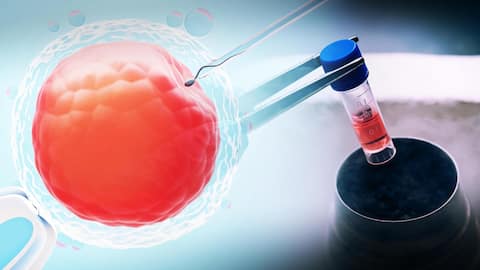All you need to know about egg freezing in India
What's the story
Delaying pregnancy through egg freezing is an increasingly common practice now. Whether driven by career goals, finding a partner, or health issues, it offers women the flexibility to manage life until they are ready for conception. Despite its familiarity, not everyone knows the process, costs, and fertility preservation benefits. Oocyte cryopreservation, also recognized as egg freezing, is a type of assisted reproductive technology (ART).
Process
Understanding the process of egg freezing
Egg freezing enables women to freeze their eggs and plan a pregnancy later in life. It is also used for donation. Stimulating egg growth, the harvested eggs are frozen at -196°C in liquid nitrogen in biologically safe conditions. Thawed eggs, combined with sperm, form embryos for uterine implantation. Although this does not guarantee a pregnancy, it can improve the chances of successfully conceiving.
FAQs
When to freeze your eggs
We reached out to Dr. Rohan Palshetkar, Head of Unit at Bloom IVF, to gain insights into the complete process and address commonly asked questions. One common query is about the ideal age for considering egg freezing. Dr. Palshetkar advises, "As age increases, the quantity and quality of eggs decrease. Ideally, it would be wise to freeze your eggs before the age of 32-35."
Procedure cost
Expenses of the procedure
Dr. Palshetkar stated, "The procedure ranges from Rs. 1-2 lakh. The cost can vary depending on the dosage of drugs required for stimulating the ovaries." Frozen eggs can be used multiple times. "We freeze eggs on multiple straws. So, we can unfreeze (thaw) them a few at a time, in case you don't want to use all of them at one go," he clarified.
Shelf life
How long can eggs be preserved and used?
"The eggs are frozen by a procedure called vitrification where the recovery rate is excellent, more than 90%. The eggs can be frozen for over 10 years. Per the Indian law, a woman can undergo IVF till age of 50. So, till you turn 50 we can keep your eggs frozen. The longest we have preserved and used is 11 years," said the expert.
Legal matters
Legalities based on women's marital status
Egg freezing is legal in India; there would be additional costs for freezing. When asked if there are their legal or procedural differences between single and married women, Dr. Palshetkar assured, "No, there isn't any difference whether you are a single woman or a married woman legally or any procedure wise." If you are freezing eggs and not embryos, spousal consent is not needed.
Thing to note
Other important things to note
Talking about other important things to be aware of during this journey, Dr. Palshetkar said, "Just because you are freezing your eggs doesn't mean you won't get pregnant naturally. This is just a method of preserving fertility." "You may also require more than one cycle to freeze a good number of eggs to ensure future fertility preservation," he explained.
